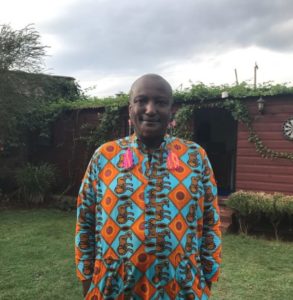
Troy Onyango, the founder and editor-in-chief of literary magazine Lolwe and author of the 2021 AKO Caine Prize shortlisted story “This Little Light Of Mine”, loves loss. Perhaps not at a personal level – although there is something masochistic about starting a literary journal. It is rather in the content of his writing that an interest in loss is detected. In each of his short stories, the reader is immersed in the darkness that comes with loss. In the Nyanza Literary Festival’s fiction prize-winning short “For What Are Butterflies Without Their Wings”, a sister loses a brother. In the short story “Sunset Dreams” published in Isele Magazine, a mother loses her teenage son. In “Origami”, published in the Johannesburg Review of Books, the protagonist loses a part of their face. And in “This Little Light Of Mine” published in Doek! Literary Magazine, Evans has lost the use of his legs. However, Onyango’s thesis is more than a fixation with loss. It is an investigation into that Joni Mitchell-esque adage – that the true value of having is in losing.
It is a truth embodied in a yearning that most of his characters have, to return to a time before a particular loss. Martha, the protagonist in “Sunset Dreams”, remembers how she paid less attention than she would’ve liked to her late son’s ambitions to be a music superstar:
…he had told her, “Mama, one day I’ll be like Lucky Dube.”
Had she laughed then, at the ridiculousness of his dreams, or had she simply shrugged and gone back to plucking the feathers from the chicken or sorting out the grains?
She wishes he was here so she could tell him, “You will be bigger than Bob Marley”
In “This Little Light Of Mine”, Onyango introduces us to the darkness that envelopes Evans. It’s been two years since the bus accident that delivered him to paralysis, taking not only the use of his legs but also his passions and a three-year romantic relationship. What he is left with is a self-pity that pushes away his family and friends and leaves him in a self-imposed lockdown. His only companion is technology, whether through his work laptop, his television, or his cell phone to which he couples the most, toggling from dating apps to porn sites. Human interaction is limited to the platonic visits from the lady who cleans his house. His attempts on the dating app are either met with coarseness or painful rejection. Even as the story opens on one of his dark lonely mornings sleeping next to his phone, he is greeted by a message so devastating that it releases his morning breath in a cry:
A sound makes his hand dart, by reflex, and reach for the phone. He hesitates then taps the screen. He sees the message and his voice comes alive with a sob, tears flowing freely from his eyes, fire burning under them.
It is only when his alarm rings that he stops crying
The narrator of “This Little Light Of Mine” notes that each of these rejections is a reminder to Evans of the unfortunate place in which he finds himself. Memory is itself a key element in Onyango’s exploration of loss. In “Sunset Dreams”, Martha struggles to let go of the memories of her late son – visions that intrude on her life and make her dish out two plates every supper time, one for herself and a plate for the absent son. “Grief is cruel, and memory is the vessel of that cruelty,” the narrator of “Sunset Dreams” observes as Martha “… remembers… forgets. She wants to forget”.
Onyango uses the body as a site of remembrance for most of his protagonists. Evans makes for the most obvious instance but there is often a scene in Onyango stories wherein the protagonist washes their body with the objective of either lathering memory on or rinsing it off their physical being. Martha is determined to be rid of her sadness as she cleanses herself of grief:
[She] scrubs her skin as if to peel off the upper layer, only stopping herself when her nail eats into the flesh on her underarm. Afterwards, she lathers her hair with coconut and lotions her skin. She feels anew. She wears nice clothes… as if clothes are capable of covering sadness.
Evans is less confident, more pleading in his wish for his body to erase at least some of the horrible memories of his accident:
[He] opens the shower. The jet of water splashes on the darkened scars on his torso and [he] rubs soap over them, massaging gently, begging them to go away. They are like war marks, the wounds caused by the shards of glass entering and exiting his body, as he lay on the tarmac…
The unnamed protagonist of “Origami”, yearning for the unrequited love of an unnamed lover, leaves traces of fragrance that may remind the lover of their role. “He lathers his body with perfumed soap and forgets to wash some of it off. He uses a towel marked with the lover’s scent and dries his body”.
Unrequited love permeates through the Onyango oeuvre. There is much that is not reciprocated in Evans’ life. He is not particularly partial to the lessons of the universe in dealing him his fate as “he finds himself wondering what he did to deserve this. Nothing. He answers himself”. The lovers he solicits do not return his advances. Even his previous serious relationship stalls too quickly post his accident for it to have been equal-sided. It is a common factor in Onyango’s protagonists. They love more than they are loved. When the protagonist of “Origami” tells his lover “I love you more than anything, don’t you know?”, the lover merely nods. Roda in “The Transfiguration”, Onyango’s Pushcart Prize nominated short story, is rejected by their family on account of their transgender identity. The theme of unrequited love adds to the toolbox Onyango takes along on his explorations into loss. It is from these furthest and darkest corners that the author seeks healing.
Onyango suggests that rather than the usual refrains of “let go and move on”, the helpful thing for those who have lost is to grab onto hope. The hope of a date (or, more accurately, of a booty call) who, knowing about Evans’ disability, still wants to come through to meet him at his house at 9 pm, energises him to the point where “[h]is body feels awake, he wheels himself around at a pace [his cleaner] has never seen him move before”.
In “For What Are Butterflies Without Their Wings” the sister grieves for her late brother through memories of the abuse she endured at his behest. But at the end of the story, she pits the remembrance of her pain against flashbacks of their innocent childhood, before her brother was corrupted by their mother’s favouritism, in the hope that the good times will rescue the memory of her brother from a hate justified by her experience. Onyango closes his stories with the tentative energy that comes from an expected resolution. Whether reality will merge with expectation is an exercise in hope extended to the reader.
The themes explored across Onyango’s work, loss, the struggle with memory, unrequited love, and hope as the instrument of healing, have been dissected and presented by the author from multiple vantages and approaches. The techniques employed in his treatise on grief make each story an artwork. Through his different works, Onyango has experimented with tense and format. The author is fond of punctuating his paragraphs with jutting lines, reminiscent of poetry, that form bridges between ideas. In their island-like positioning, these lines create a dramatic effect that further pulls you into the story. The near nine-line paragraph that opens “Sunset Dreams” is followed by two lines that break the previous mass of words from those that follow as if they themselves halt time:
Two years have passed.
And yet time seems to have stood still.
In a brilliant execution of ‘show, don’t tell’, Onyango doesn’t tell us straight away that the protagonist of “This Little Light Of Mine” is paralysed. The revelation is made gradually through hints, like the methodical description of how Evans gets up from his bed. “He pulls himself up on the bed, presses his legs together, and slowly lifts them towards the edge of the bed. He lowers them. The right foot touches the floor first, then the left.”
The staccato description of an action that is ordinarily swift and banal to most able-bodied persons suggest something varied from expectation. Onyango does not labour the revelation by describing that Evans lifts his legs with his arms. But once you read the description of his next movements, the situation is illuminated:
He grabs the chair by its wheel and pulls it towards him. The thin wheel rolls backwards slightly. With one rehearsed move he lifts himself off the bed—his weight resting on his arms—and onto the seat. He breathes slowly and bites on his lower lip leaving teeth marks
And while he can be gentle about taking the reader to these dark places, Onyango does not shy away from the incongruencies of complex characters that make compassion difficult. Evans’ self-pity is both sad and frustrating when he sends money via M-pesa to a stranger he meets on his dating app, who then summarily blocks his number and switches off their phone. In “Origami”, the protagonist’s insecurities about his lover’s affection are proven legitimate when he catches the lover in the bathroom of a nightclub, tongue twisted with that of a stranger. But whatever sympathy you develop for him over the first two-thirds of the story is smothered by the horrendous act of retribution he carries out. The callousness with which he moves on from the act – this protagonist with whom, till this point, you had aligned yourself, dear reader – leaves you unsettled:
He goes to the bathroom and washes the dried blood off the tip of his penis. He forgets to wash the rest of his body. He throws on a clean striped blue shirt and a pair of navy blue pants and he goes to church.
Onyango also seems to have a fascination with the number three. Martha “moves three steps closer to where [a boy playing guitar sits]; not too close but also not far”. There are three wingless butterflies trapped by the brother in the story “For What Are Butterflies Without Their Wings”. The lover in “Origami”, when asked where they have been since the gruesome act of retribution by the narrator, gives a cryptic answer of “Three years”. Roda, in the story “Transfigured”, is kicked out of her home three weeks after being caught in an indiscretion by a tattle tale sister. Whether the number has some significance or is just Onyango’s favourite or is just a reach by this reviewer’s imagination is part of the magic that comes with engaging with this talented author’s work.
The combination of the elements of insightful content, meticulous technique, and complex, sometimes disturbing characters, wielded by an expert like Onyango, yields work that is affecting and worthy of the recognition it has gained on the continent and beyond.
Photo by Photography Maghradze PH from Pexels









COMMENTS -
Reader Interactions